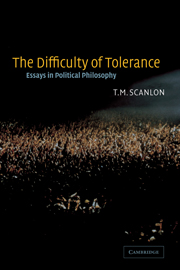Book contents
- Frontmatter
- Contents
- Acknowledgments
- Introduction
- 1 A theory of freedom of expression
- 2 Rights, goals, and fairness
- 3 Due process
- 4 Preference and urgency
- 5 Freedom of expression and categories of expression
- 6 Human rights as a neutral concern
- 7 Contractualism and utilitarianism
- 8 Content regulation reconsidered
- 9 Value, desire, and quality of life
- 10 The difficulty of tolerance
- 11 The diversity of objections to inequality
- 12 Punishment and the rule of law
- 13 Promises and contracts
- Index
1 - A theory of freedom of expression
Published online by Cambridge University Press: 15 December 2009
- Frontmatter
- Contents
- Acknowledgments
- Introduction
- 1 A theory of freedom of expression
- 2 Rights, goals, and fairness
- 3 Due process
- 4 Preference and urgency
- 5 Freedom of expression and categories of expression
- 6 Human rights as a neutral concern
- 7 Contractualism and utilitarianism
- 8 Content regulation reconsidered
- 9 Value, desire, and quality of life
- 10 The difficulty of tolerance
- 11 The diversity of objections to inequality
- 12 Punishment and the rule of law
- 13 Promises and contracts
- Index
Summary
Persecution for the expression of opinions seems to me perfectly logical. If you have no doubt of your premises or your power and want a certain result with all your heart you naturally express your wishes in law and sweep away all opposition. To allow opposition by speech seems to indicate that you think the speech impotent, as when a man says that he has squared the circle, or that you do not care wholeheartedly for the result, or that you doubt either your power or your premises. But …
Oliver Wendell HolmesThe doctrine of freedom of expression is generally thought to single out a class of “protected acts” which it holds to be immune from restrictions to which other acts are subject. In particular, on any very strong version of the doctrine there will be cases where protected acts are held to be immune from restriction despite the fact that they have as consequences harms which would normally be sufficient to justify the imposition of legal sanctions. It is the existence of such cases which makes freedom of expression a significant doctrine and which makes it appear, from a certain point of view, an irrational one. This feeling of irrationality is vividly portrayed by Justice Holmes in the passage quoted.
To answer this charge of irrationality is the main task of a philosophical defense of freedom of expression.
- Type
- Chapter
- Information
- The Difficulty of ToleranceEssays in Political Philosophy, pp. 6 - 25Publisher: Cambridge University PressPrint publication year: 2003
- 14
- Cited by



